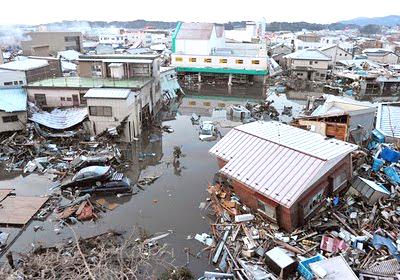The sun rose from the east horizon on the morning of March 11 in Sendai, Japan, as usual. By 2:45 p.m., men and women were already well settled into their jobs for the day, as usual. Young children were walking home from school, as usual. It was a normal day. A beautiful day. Then, a minute passed and the ground began to shake.
At 2:46 p.m., an earthquake with a magnitude of 8.9 hit off the northeast coast of Honshu, the island of Japan that is home to the cities Sendai, Tokyo, and Yamagata. According to CNN.com, it was the strongest earthquake to hit Japan in recorded history. Buildings shook, fires ignited, and people fled for cover as unsecured items crashed to the ground. Afterward, the aftershocks continued to roll in, some with a magnitude of over 6.0.
A former Guilford exchange student (‘07-’08) from Japan, Ryoko Maeda, described the experience through an instant message.
“I was getting seasick from the ground shaking (from the aftershocks),” Maeda wrote to senior Kacey Pelletier. “It went on for so long that we couldn’t tell if the shaking was caused by the aftershock from this earthquake or if it was the beginning of another.”
After the initial quake, there was a cautious sigh of relief. Unfortunately, the damage caused from the earthquake would be the least of their worries.
Sirens blared, warning people of an approaching tsunami. The city of Sendai, home to approximately 1.5 million people, was engulfed by a tsunami about an hour after the earthquake hit.
Sendai was not the only city hit by the tsunami. Almost all of the cities along the east coast of Honshu were also hit, including — though not limited to — Yokohama and Chiba.
Sendai was one of the cities that suffered the most from the tsunami. The 10-meter-high (33 feet) wall of water destroyed crops, and swept away houses and cars. People fled the city and took refuge on rooftops to avoid the debris carried through the street by the water.
Wireless Internet and cellphone services were down all over Japan. Though other cities were not hit by the tsunami, some larger cities, such as Tokyo, still suffered damage from the earthquake. Bullet trains, which typically operated 24/7 without fail, were not running. People were stranded at work, school, or the nearest shelter they had found.
According to CNN, Ichiro Fujisaki, Japan’s ambassador, said that about 10 percent (approx. six million) of the country’s households were without electricity.
At the time, the number of missing persons was estimated to be in the tens of thousands. According to BusinessWeek, as of Monday, March 20, there were at least 7,348 confirmed deaths though more are being found every day. Thousands are still missing.
Within hours after the tsunami hit, recovery efforts were underway. Rescue teams were assembled and deployed to Japan to help search for survivors and begin cleanup from more than ten countries.
“I’m very pleased about the way that other countries are responding to the aftermath of the earthquake,” said Hiroko Hirakawa, associate professor of Foreign Languages. “Japan has been receiving so much help from so many countries, even from those that are facing their own difficult times, such as Afghanistan.”
According to WNC World News, over 70 countries have offered to help in any way possible. These countries include allies such as the United States, as well as countries that are sometimes in conflict with Japan, such as China.
“I want to use this opportunity to say that the deepest condolence for the people of Japan for the loss they experience,” said Chinese Prime Minister Wen Jiabao, to WNC World News.
In the immediate Guilford community, people are banding together, offering support to those who were affected by the earthquake.
Guilford College students are doing what they can to help, including hosting bake sales to raise money and having small candlelight vigils.
“I am so touched by the support that I have been receiving,” said Hirakawa.. “I was lucky to have not been directly affected by the earthquake, but many people have come up to me asking if I am alright and offering their help and support.”
According to BBC News, the islands of Japan are located in an area where earthquakes are very common and the country takes extra precautions against them. Buildings are constructed to withstand the force of common earthquakes and the tsunami warning system is tested regularly to ensure that it is functioning properly.
But this earthquake proved too strong. Although the damage was devastating, people are confident in Japan’s ability to heal.
“Japan will recover,” Hirakawa said. “It may take many years, but we will recover.”
As with all tragedies, there will be long-lasting effects. For some, either willingly or unwillingly, the memories of this earthquake may slowly fade as the rubble is carried away and new buildings are constructed. For others, either willingly or unwillingly, it may remain with them forever as a pivotal point in their lives.
“My generation has been considered to be a ‘spoiled generation,'” said former Guilford exchange student from Japan Noe Takahata. “We were born into a thriving country. However, now we will really have to think about our actions and our plan for the future because things are going to be much more difficult for all of us.”

